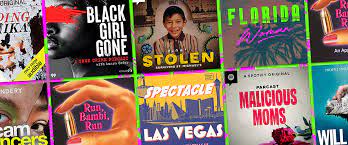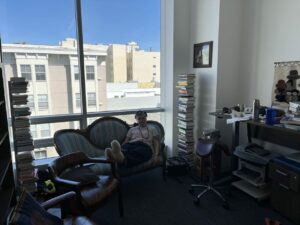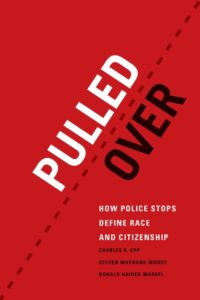
In the last few months, due to a combination of insomnia and long workouts, I’ve been listening to a lot of podcasts, many of which are true-crime themed. Some of these are long-form podcasts, which follow an individual case, and some feature numerous cases, devoting an episode or two to each. This has led me to rethink about the victims’ rights movement and consider how the new landscape of crime podcasting has changed its focus.
The criminological literature tends to paint the emergence of the victims’ rights movement in the U.S. as a monolith: comprised primarily of white, middle- or upper-class people whose relatives were victims of stranger homicide, pioneers in victim advocacy have tended to advocate for harsher punishments, the death penalty, abolition of parole, harsher prison conditions, etc. In some cases, as Josh Page documents in The Toughest Beat, they partnered with California’s prison guards union. In other cases, as I documented in Yesterday’s Monsters, they pioneered victim presence at parole hearings, with the only possible approach being clamoring for parole denial. Our harsh habitual offender laws were largely the product of Mark Klaas’ advocacy, in the aftermath of the murder of his daughter Polly.
And yet, evidence abounds to the fact that victims are not, actually, a monolith. In my partnership with violence prevention coalitions, I’ve met many victims’ families–mostly black, working-class people–who don’t feel at home with this punitive approach, and call for social change instead. We’ve seen some stunning examples of victim forgiveness (even as know-it-alls on the Internet tell them how to mourn their relatives.) It looks like victims of acquaintance homicide, rather than stranger homicide, are less punitive, and that punitiveness declines when victims and offenders encounter each other.
My extensive, though unsystematic, course of listening to true-crime podcasts suggest that today’s true-crime media lends its voice to multiple victim perspectives, incorporating some critiques of punitiveness, excessive policing, and mass incarceration, and rejecting the victim/offender dichotomy that characterized so much of the early days of the movement. Many episodes include frank descriptions of victims’ lives, including their criminal records, drug abuse, and mental illness–not to blame them, or cast a negative light on them, but rather to point out that even people who struggled in their lives deserve to be found and for their fate to be discovered. Many episodes explicitly feature victims of color, victims who worked in the sex industry close to their demise, and victims who had complicated relationships with their suspected killers or abusers. In many of these episodes, the podcasters explicitly point out that they are looking to bring attention to these left-behind cases.
I’m also noticing that the podcasts feature plenty of rage over inappropriate policing, such as the forceful extraction of confessions or sloppy forensic works. This falls in line with much of what I’ve been thinking about recently: that the problem is not so much overpolicing or underpolicing, but rather the wrong kind of policing altogether (more focus on stop-and-frisk harassment and humiliation than on, well, solving crimes.) Podcasters’ voices become emotional not only when describing the victims’ plight, but also when describing harsh incarceration conditions suffered by wrongly convicted suspects. Notably, podcasters feature ambivalence toward family members who (wrongly) maintain that someone cleared of all connection to the crime (through DNA and, say, proof that a confession was coerced) is guilty: they offer empathy but, plainly and politely, state that they disagree.
Because podcasters have to provide what their public is interested in hearing, one can tell that criminal justice issues percolate from public debate into these programs–first among which is the issue of racial justice. I’ve seen extensive coverage of hate crimes, complete with fundraisers for racial justice organizations, and in cases that involve black perpetrators and victims the focus is on getting justice and attention for the victim, rather than punishment for the offender.
Relatedly, these podcasts also choose to feature a variety of different victim voices. Some families, you’ll hear, are staunch supporters of the death penalty, wishing for the murderers of their loved ones to suffer. Others say that they don’t much care about the punishment, but rather about solving the crime. Many podcasts offer no judgment, letting the victims be themselves rather than the world curators of criminal justice. I really appreciate this perspective.
Much of this pluralistic, multifaceted approach relates to the fact that many true crime podcasts focus on unsolved crimes. The main question driving the narrative is what happened, rather than what the sentence will be. This, to a great degree, depoliticizes the content, focusing it on something we presumably all want: to solve serious crime cases.
This change of focus reminds me of something different, but related. In a really interesting, clear-eyed piece, Keith Findley argues that the emergence of innocence as a topic of conversation has, to some extent, broken the impasse between crime control and due process enthusiasts. Even the staunchest crime control proponent would not like to see an innocent person behind bars; even the scrappiest due process advocate wants solid proof of a crime at trial. I think a similar maneuver happens with these podcasts. The idea that we need to find out what happened eclipses the focus on retribution, just deserts, and what happens later, breaking the impasse and finding some depolicitized commonality among victims of unsolved crime.
I may write something about this at a later date; I think that these podcasts offer an interesting counterpart to the usual crime daytime TV, reviewed by Danny LaChance and Paul Kaplan in their book Crimesploitation. Let there be no mistake: true-crime podcasts crimesploit to the Nth degree. But I think they do it in a different way that is worth exploring.




No comment yet, add your voice below!